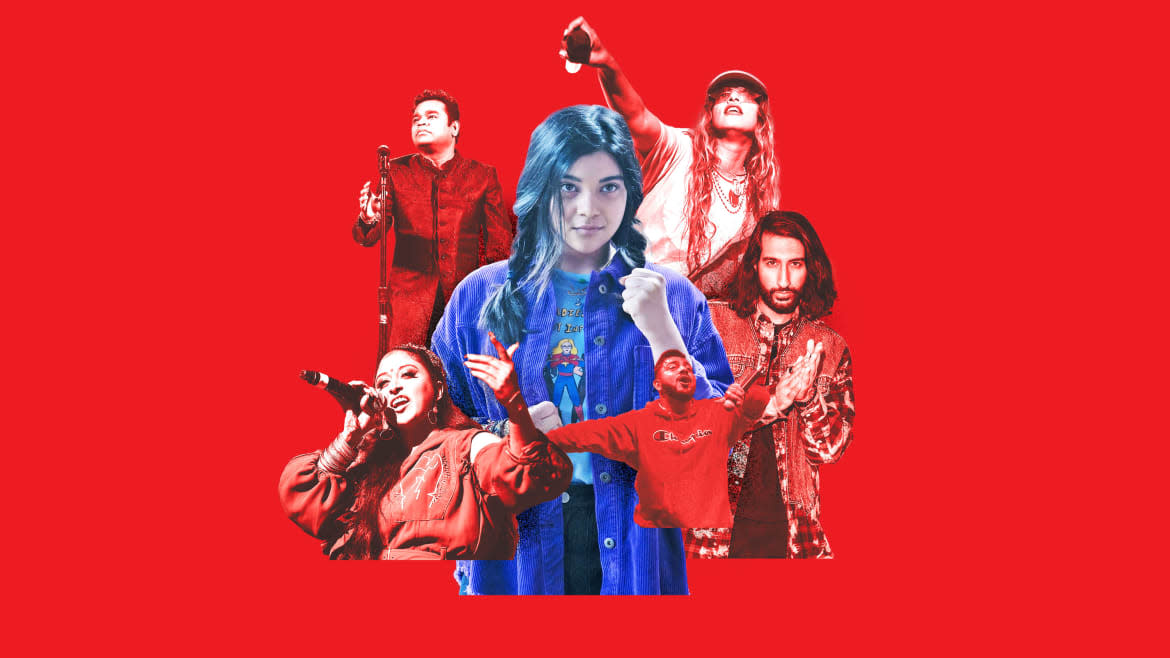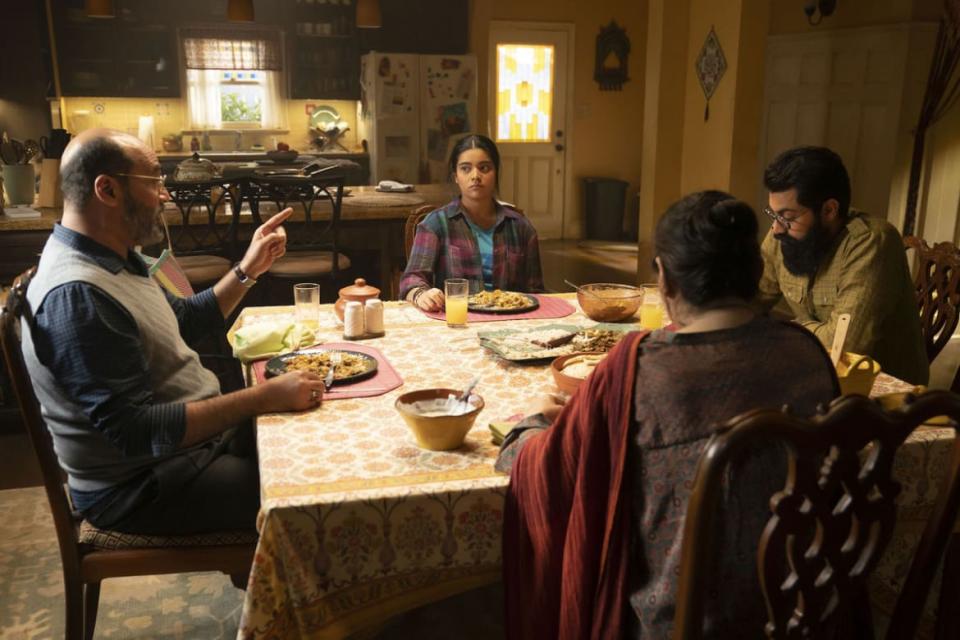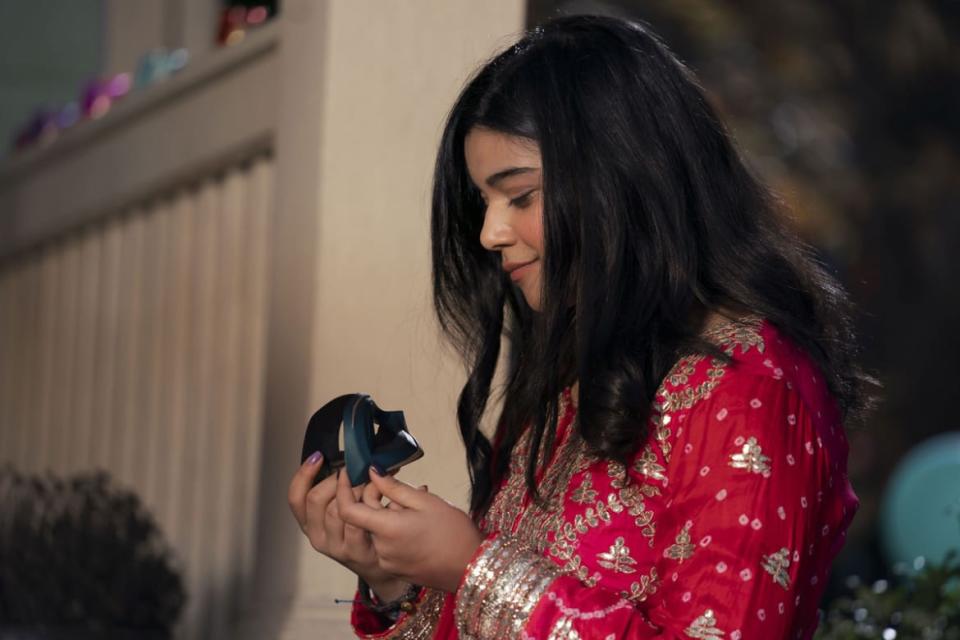The Music of ‘Ms. Marvel’ Has a Lesson for Hollywood

When I heard the faint notes of the hit South Indian song “Oh Nanba” in the first episode of Ms. Marvel, I thought I was imagining them. But then, as I kept watching and kept hearing songs that I grew up listening to in the background, I realized that, no: This was really happening. A Marvel show was really playing an actual South Asian song in a show about a Desi superhero.
When Marvel announced it was granting comic book hero Ms. Marvel, a.k.a. Kamala Khan, her own show I—a brown, Indian girl, was elated. Finally: a superhero that looked like me, with a background not unlike mine. But with that euphoria also came dread. While the series was affecting and authentic on the page, I wondered how Marvel would translate a brown, Pakistani American superhero onto the big screen. Would the show make a mockery out of South Asian culture, as many other American-made TV series have in the past? Would Marvel whitewash the show both on- and off-screen by casting white actors, like they did when they cast Tilda Swinton as the Ancient One in Doctor Strange? Would it employ white writers to try to tell our stories? Would it force an awkward dance number, set to that generic sitar stock music usually saved just for brown characters?
‘Ms. Marvel’ Proves That Marvel’s TV Shows Are Now Way Better Than Its Movies
Now that its six-episode first season is over, Ms. Marvel has proven to be a sensitive, heartwarming depiction of Desi culture. The show balances an authentic portrayal of what it’s like to be South Asian-American with the requisite superhero stuff—and it all comes together as a true celebration of Kamala’s culture. Watching Ms. Marvel, I asked myself: Is this how white people feel all the time while consuming content? Because I’d like to feel like this all the time too.
The show’s most inspired, successful attempt at offering true Desi representation is through its soundtrack. Ms. Marvel’s music department pulled from some of the most celebrated artists of South Asia, as well as some of the most underrated. In just six hours, Ms. Marvel fits in everything from Bollywood songs, to well-known Pakistani and South Indian music, to newer-generation gems from artists like Ritviz, Raja Kumari, and Tesher. For good measure, the soundtrack also features South Asian greats that are already cemented in western culture, like M.I.A. (“Come Around” with Timbaland), A. R. Rahman (“Oh Nanba”), and Riz Ahmed (“Deal With It”).
Ms. Marvel deploys its varied soundtrack intentionally. In episode three, Kamala’s brother, Amir, gets married as the beautiful notes of A. R. Rahman’s “Tere Bina” (from the Bollywood film Guru) play. The late Lata Mangeshkar’s voice rings throughout a shoe-stealing ritual in the same episode a few minutes later—in which the bride’s siblings hide the groom’s shoes, and if he can’t find them, he has to pay up. The song is “Joote De Do Paise Le Lo,” which literally translates to “give me the shoes and take the money.”

Abida Parveen and Naseebo Lal’s Coke Studio gem “Tu Jhoom,” Ahmed Rushdi’s Pakistani household classic “Ko Ko Korina”, Ritviz’s “Thandi Hawa” and “Sage,” and the ever-iconic “Yeh Mera Dil,” from Amitabh Bachchan’s Don, all appear as well—beloved songs in South Asian culture, but not ones typically heard in a mainstream Western property like the MCU.
Ms. Marvel’s soundtrack feels so special because of how little regard it pays for whether or not Western viewers will recognize the music. It’s a rare element of non-white, non-Western authenticity in Hollywood content, which typically doesn’t aim for accuracy.
Instead, Hollywood often portrays Desi culture in outright insensitive ways. The Office’s Season 3 episode “Diwali” is one such example of a show taking a Desi tradition and making it the butt of the joke. Viewers may have given it a pass upon its 2006 debut, as the show is basically satire. But the exaggerated way in which The Office portrays the festival leaves a bad taste. From Michael calling the cultural festival “Indian Halloween,” to Kelly Kapoor (Mindy Kaling), who is an Indian character, not really knowing what Diwali is about, the entire episode feels like punching down. Even the episode’s use of the popular Bollywood song “Mehndi Laga Ke Rakhna” comes across as a diss: It’s a wedding song and has no place in a Diwali party.
The MCU’s Biggest ‘Ms. Marvel’ Tweak Undoes a Powerful Story on Race
New Girl makes a comparably misguided attempt at Desi representation: During a Season 2 featuring Indian-American character Cece Parikh’s wedding, the show plays generic stock music during most of the festivities. Even if The Office chose poorly with its Bollywood song choice, at least it made an attempt. New Girl just chose not to tap from the varied song catalogue of the second-largest film industry in the world, going with something totally fake instead.
But perhaps part of the reason that American portrayals of South Asian culture often struggle with the music aspect is because of preconceived notions around Bollywood. Because Bollywood movies are typically musicals, the soundtracks—which are hugely popular and dominant in South Asian music scenes—may seem hard to divorce from their original contexts. The root cause of this problem is not having enough representation behind the scenes: If Hollywood employed more South Asian people to tell South Asian stories (or in general!) you’d get authentic storytelling, right down to the choice of music.
Ms. Marvel incorporates Bollywood music with open arms. This is thanks to South Asian writers, directors and producers who have been working tirelessly behind the scenes to provide the authenticity it deserves. The show has used songs from multiple decades (“Joote De Do Paise Le Lo,” from the ’90s; “Yeh Mera Dil,” from the ’70s; “Hadippa,” from the ’00s), and not all of them are mainstream household classics. Featuring indie artists like Ritviz and Raja Kumari and using songs from all over South Asia–especially highlighting the Pakistani music industry; Kamala herself is Pakistani—makes this beautiful story all the more richer.

The show’s affection for Desi culture is made clear in myriad ways, from the refreshingly sensitive portrayal of Desi history to how it tells the story of Kamala and her family’s everyday life. But the soundtrack stands out as the most special, thanks to its unique and exciting specificity.
That’s the magic of Ms Marvel— the music is the heart of this show. And it’s beating loud and clear.
Get the Daily Beast's biggest scoops and scandals delivered right to your inbox. Sign up now.
Stay informed and gain unlimited access to the Daily Beast's unmatched reporting. Subscribe now.

